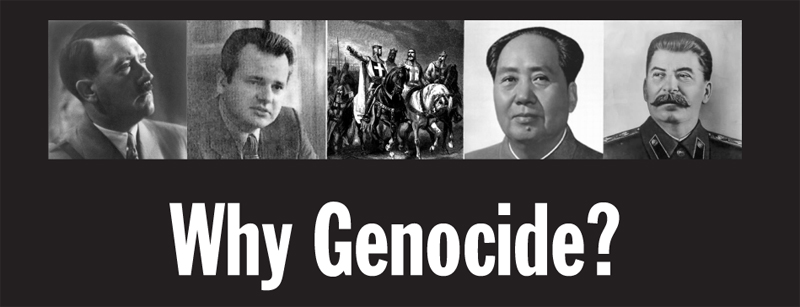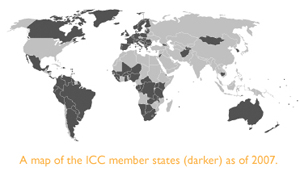Why Genocide?

Over the past fifteen years United Nations tribunals have addressed genocide issues associated with conflicts in Bosnia, Rwanda, and Darfur. The most recent development in this connection is the arrest on July 18, 2008, of Radovan Karadžić, a man who had been indicted by the International Criminal Tribunal for the Former Yugoslavia on charges that he, “acting individually between 1 July 1991 and 19 July 1996, or in concert with others,” committed acts of “genocide; crimes against humanity; violations of the laws or customs of war and grave breaches of the Geneva Conventions of 1949.” Four days before this, on July 14, the prosecutor of the International Criminal Court pursued an arrest warrant for Sudanese President Omar Hassan Ahmad al-Bashir on ten counts of “genocide, crimes against humanity and war crimes” allegedly committed in Darfur since July 1, 2002.
That such legal actions can prove effective is demonstrated not only by the media publicity generated worldwide but by a recent track record of prosecutorial success. For example, Jean Kambanda was sentenced to life imprisonment for genocide and related crimes committed while he was prime minister of Rwanda in 1994. This action was taken by the International Criminal Tribunal for Rwanda on September 4, 1998. Of special interest is the fact that Kambanda pleaded guilty to the offense. And the tribunal has so far completed twenty-one trials, resulting in the convictions of twenty-eight people for various crimes in connection with the Rwandan genocide.
So the machinery for indictment, arrest, trial, and conviction is not only in place but its reach and influence are expanding. This is because the world has grown increasingly impatient with both nations and individuals that commit such crimes.
 With the existence of such worldwide interest in stopping genocide, the question naturally arises: why do mass killings and genocide occur in the first place? What could possibly motivate human beings to visit such inhumanity, such extreme levels of violence and murder, upon their fellow humans–even a portion of the population of their own country? How do people get past normal human empathy and the natural promptings of conscience so as to even be able to carry out such horrors?
With the existence of such worldwide interest in stopping genocide, the question naturally arises: why do mass killings and genocide occur in the first place? What could possibly motivate human beings to visit such inhumanity, such extreme levels of violence and murder, upon their fellow humans–even a portion of the population of their own country? How do people get past normal human empathy and the natural promptings of conscience so as to even be able to carry out such horrors?
Are such people mad? That would be a difficult case to make, given the large number of human beings who have, throughout history, abetted mass killings and genocide.
Are they driven by poverty and competition for scarce resources necessary for survival? Such a reason may explain a number of examples, but it can’t explain the European and American war on the Indians of the Western Hemisphere or many other conquests.
Is it due to lack of education? Not necessarily. Leading up to World War II and the Nazi genocide, Germans were among the most highly educated people in the world.
Is it due to the power of an absolutist ideology: be it religious, philosophical, or political? Such has been used to explain the Muslim conquests of the Middle Ages, the Christian Crusades and Inquisition, the French Revolution’s “Reign of Terror,” and the pogroms of Mao Zedong and Joseph Stalin. But it doesn’t explain all the mass killings and genocide associated with history’s many wars of pure conquest. Consider the actions of the consul Marius during the Roman invasion of Numidia in North Africa in the year 107 BCE. Here the Roman historian Sallust calmly relates what the Roman army did after the town of Capsa surrendered without a fight:
The town, however, was burned. The Numidians, such as were of adult age, were put to the sword. The rest were sold, and the spoil divided among the soldiers. This severity, in violation of the usages of war, was not adopted from avarice or cruelty in the consul, but was exercised because the place was of great advantage to [the enemy], and difficult of access to us, while the inhabitants were a fickle and faithless race, incapable of being influenced either by kindness or terror. (Jugurthine War, Chapter 91, translated by John Selby Watson.)
Also, ideology can’t be claimed as an influence on nonhuman animals, such as our closest zoological relatives, the chimpanzees and bonobos. Raiding parties of these animals have been known to cross briefly into other territories and deliberately seek out and kill members of another group. Most dramatically, Jane Goodall observed chimpanzees in Gombe methodically, over a three-year period, wipe out a neighboring chimpanzee group.
So what’s the explanation? Philosopher Peter Singer, in One World: the Ethics of Globalization, offers an answer using the Bible story of how Moses, in Numbers 31:1-18, makes war for no apparent reason against the Midianites, burning all their cities and killing all the adults and male children. “But all the women children that have not known a man by lying with him,” Moses orders, “keep alive for yourselves.” A growing number of scholars today doubt that this war ever happened, but its description fits nonetheless with practices that have been used by many peoples, from ancient times to the present (as the quotation from Sallust shows). It also fits the behaviors of chimpanzees and bonobos.
So, using the biblical story simply for illustrative purposes, Singer writes that if God “had given Moses a modern genetics textbook and commanded him to do whatever would maximize the number of Israelite descendants, then Moses might have acted exactly as he is portrayed as doing in Numbers.” This is because killing off all the men and boys eliminates the genetic competition. And killing off all non-virgin women ensures that none survive who might be pregnant with Midianite children. By this means no one of full Midianite descent can survive to the next generation. Then, allowing the Israelite males to impregnate the virgin Midianite females leads to more Israelite descendants. In sum, this practice of ethnic cleansing confers actual genetic benefits on the victors.
Given this uncomfortable fact of nature, of human history, and of the modern world, what can we do? Well, we certainly don’t wish to live in a Darwinian jungle where survival of the most genocidal is the rule of life.
That’s where a human invention called civilization comes in. What is civilization, after all, but humanity’s effort to repeal the law of the jungle? It is, in a sense, a conspiracy of the weak against the strong for the benefit of all. And it has proven itself extremely effective.
The key to ending modern outbreaks of mass murder and genocide, then, is to first realize that these practices do normally benefit those who use them. Second, the world community needs to become so structured that these benefits are clearly outweighed by new liabilities. In other words, humanity has to consciously decide that mass murder and genocide are unacceptable and then vigorously and consistently act in ways that discourage their practice as well as lead to their elimination.
Toward this end, there are numerous peaceful courses of action that have been developed in recent years. One has been the World Court and the International Criminal Court, which have brought leading perpetrators of such crimes to justice and hence served as a deterrent against future actions of this type. The case of Slobodan Milosevic of Serbia shows that even a head of state can be brought by his own country to the bar of international justice. There are also economic sanctions. And, however feeble it may seem at times, the power of the media or organizations like Amnesty International to mobilize international opinion against such atrocities has created enough pressure in certain instances to bring about amelioration or change.
 Nonetheless, there are occasions when all these efforts fail. In such circumstances, “rules of engagement” or valid and workable “criteria for humanitarian intervention” are needed for guiding nations in deciding precisely when and how to intervene in the internal affairs of another country. Military action to stop crimes against humanity or genocide can be warranted. But safeguards are needed, since noble justifications have frequently been claimed for unwarranted invasions. Examples exist as far apart in history as Julius Caesar’s Gallic Wars and George W. Bush’s invasion of Iraq.
Nonetheless, there are occasions when all these efforts fail. In such circumstances, “rules of engagement” or valid and workable “criteria for humanitarian intervention” are needed for guiding nations in deciding precisely when and how to intervene in the internal affairs of another country. Military action to stop crimes against humanity or genocide can be warranted. But safeguards are needed, since noble justifications have frequently been claimed for unwarranted invasions. Examples exist as far apart in history as Julius Caesar’s Gallic Wars and George W. Bush’s invasion of Iraq.
But in 2001, Canada’s International Commission on Intervention and State Sovereignty issued a report entitled The Responsibility to Protect. It takes the position that, when two criteria are met, there isn’t merely a right to intervene but a responsibility to do so. The criteria offered are:
A. large-scale loss of life, actual or apprehended, with genocidal intent or not, which is the product either of deliberate state action, or state neglect or inability to act, or a failed state situation; or
B. large-scale “ethnic cleansing,” actual or apprehended, whether carried out by killing, forced expulsion, acts of terror or rape.
Currently the most appropriate body to decide when and where these criteria have been met would be the United Nations rather than any individual nation acting alone or in coalition with partners.
Applying these criteria to specifics, the situation in Darfur exemplifies the need for a swift, strong, and just international response, though not an invasion at this time. In order to recognize the inherent worth and dignity of every human being, universal investigation and prosecution of those responsible for the current atrocities are necessary. In the short run, these actions can reduce further violence in Darfur; in the long run, justice and accountability will be served–not only to the benefit of the victims but toward building long-term peace in the region.
Of course there’s much more to all of this. But the general nature of the problem and the general nature of the solution should be clear. The details–including considerations of pitfalls and safeguards associated with military intervention in any crisis of this sort–need to be worked out over time by the best minds that can be brought to the task. Overall, the international motivation should be a strong determination to so restructure global society that massive atrocities and genocide no longer profit their perpetrators.
We must establish power disincentives. And we must say, and mean, “never again,” not merely in response to the genocidal example of the Holocaust but in response to all such actions: past, present, and future.
Fred Edwords is director of communications for the American Humanist Association
